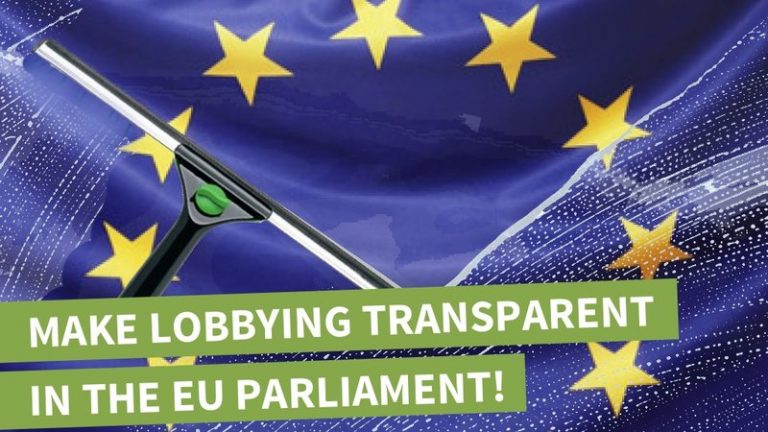Today the constitutional committee of the European Parliament voted on proposals to change the internal rules of procedure of the Parliament (“Corbett report”). The changing of the rules caused intensive debates over minority rights in the Parliament, lobby transparency, stricter rules on integrity and transparency. The Greens had presented a “plan for integrity and transparency in the European Parliament” which consists of 59 amendments to the rules of procedure in this regard. All adopted changes to the rules of procedure have to be confirmed by an absolute majority in the plenary of the Parliament. The vote is expected for the December plenary so that the new rules can come into force on the 1st of January 2017. Many of the losses and achievements listed below were controversial so that narrow roll call votes can be expected and nothing can be taken for grated.
The results of the vote in AFCO committee MEP Sven Giegold, rapporteur of the EP on transparency, integrity and accountability commented:
‘MEPs have voted welcome stronger rules for conflict of interest in the Parliament. It is highly welcome that there shall now be a ban to be a paid lobbyist while serving as a member of parliament, against fierce resistance of the Conservatives. New members of the EU Commission will have to go through tougher integrity tests in the Parliament.
But, it is poor show that all our demands to strengthen lobby transparency in the Parliament were defeated because of resistance by conservatives and liberals. Even rapporteurs and committee chairs may keep secret which lobbyists they meet or which written lobby input they get.
Against original plans the rights of minorities in the Parliament will not be cut unduly.’
Please, find a brief overview of voting behaviour by Conservatives (EPP), Social-Democrats (S&D), Liberals (ALDE) and Greens here:
https://sven-giegold.de/wp-content/uploads/2016/11/Result-Key-Votes-Corbett.pdf
———-
ACHIEVEMENTS in the Committee vote
Candidates for the post as Commissioner can proceed in their hearings only when cleared by the Legal Affairs Committee (JURI) of any conflict of interest.
Allegations of conflicts of interest of MEPs have to be sent by the Parliament’s President to the Advisory Committee if they are not manifestly vexatious. The President therefore has no room to block such investigations anymore.
The ban on lobby side jobs of MEPs is toughened by explicitly ruling out paid lobby work for MEPs.
Big groups can no longer veto inquiry committees or specific aims when such a request passes through the Conference of Group Presidents before its voted in plenary. The inquiry committee on the Luxembourg Leaks were blocked by the Conference of Presidents.
More transparency about who finances EU Parliament’s intergroups, formalised lobby meetings between MEPs and organised interest representatives.
Lobbyists who refuse to accept hearings before the European Parliament lose their entrance badges. And lobbyists will not be able to get EP entrance badges that disguise them as the entourage of an MEP.
The results of trialogue meetings have to be made public in writing, not just in a minimalist and oral version in Committee.
LOSSES in the Committee vote
On lobby transparency no progress was possible. If MEPs compile a legislative footprint to show who lobbied them on their reports and if they meet exclusively lobbyists who are in the Transparency Register remains unregulated. Better rules will depend on the negotiations of the new interinstitutional agreement on the Transparency Register between Parliament, Commission and Council.
Shadow rapporteurs will not be checked for conflicts of interest.
Cooling off: MEPs can still take lobby jobs directly after their mandate. A minimalist obligation to notify the Parliament will remain without effect because no one is called to check notifications on conflicts of interest.
If the Advisory Committee finds that MEPs violated the code of conduct with a conflict of interest and recommend sanctions, the Parliament’s President can still block the application as he did with all sanctions recommended to him so far. Furthermore, the Advisory Committee remains composed only of MEPs, no external experts will balance the de facto conflict of interest of MEPs who investigate into the conduct of colleagues.
The Advisory Committee is not called to better define conflicts of interests in general.
No clarification that payments for speeches, articles or extra functions of MEPs should be included by the ban on MEPs taking money for their political decisions.
MEPs still only have to declare income but not property and debts as Parliamentarians have to do in France, Croatia and other countries.
Despite some progress on reporting about trilogue results, most documents in trilogues will still be treated differently from other legislative documents in the negotiations should not be treated differently from the usual transparency in legislative processes.
How Commission and others follow up on Parliament’s recommendations will not be listed by Parliament. There will be no new pressure to take Parliament serious.
————–
Please, find all our complete ‘Green plan for transparency and integrity’ here:
https://sven-giegold.de/2016/green-plan-for-transparency-and-integrity-in-the-european-parliament/

